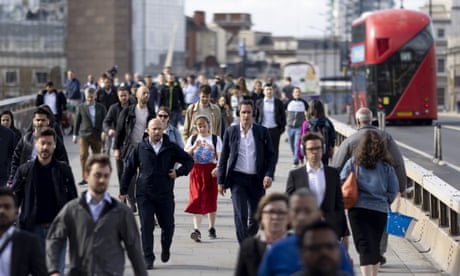- by foxnews
- 08 Apr 2025
AI ‘could be as transformative as Industrial Revolution’
AI ‘could be as transformative as Industrial Revolution’
- by theguardian
- 07 May 2023
- in technology

The new genre of AI could be as transformative as the Industrial Revolution, the government's outgoing chief scientific adviser has said, as he urged Britain to act immediately to prevent huge numbers of people becoming jobless.
Sir Patrick Vallance, who stood down from his advisory role last month, said government should "get ahead" of the profound social and economic changes that ChatGPT-style, generative AI could usher in.
However, in a wide-ranging final parliamentary hearing that also covered his reflections on the pandemic and the rise of China as a global scientific power, he suggested AI could also have considerable benefits that should not be overlooked.
"There will be a big impact on jobs and that impact could be as big as the Industrial Revolution was," Vallance told the Commons science, innovation and technology committee. "There will be jobs that can be done by AI, which can either mean a lot of people don't have a job, or a lot of people have jobs that only a human could do.
"In the Industrial Revolution the initial effect was a decrease in economic output as people realigned in terms of what the jobs were - and then a benefit," he added. "We need to get ahead of that."
Vallance called for a national review of which sectors would be most significantly affected so plans could be drawn up "to retrain and give people their time back to do [their jobs] differently".
The comments follow an announcement by IBM this week that it is suspending or reducing hiring in jobs such as human resources, with a suggestion that 30% of its back-office roles could be replaced by AI in five years.
Echoing comments by the AI pioneer Geoffrey Hinton, who announced his departure from Google this week, Vallance said the most immediate concern posed by AI was ensuring it did not "distort the perception of truth".
He added that there was also a broader question of managing the risk of "what happens with these things when they start to do things that you really didn't expect".
Despite these potential existential threats, the technology also presented opportunities, Vallance argued. "In medicine, it could be that you get more time with your doctor rather than being pressurised," he said. "That could be a good outcome."
"We shouldn't view this as all risk," he added. "It's already doing amazing things in terms of being able to make medical imaging better. It will make life easier in all sorts of aspects of every day work, in the legal profession. This is going to be incredible important and beneficial."
Vallance, who is now chair of the Natural History Museum, appeared sceptical about the prospect of developing a British version of ChatGPT, dubbed Brit-GPT, which some experts have called for in recent months. In March, the Treasury committed �900m to building a supercomputer to boost sovereign capabilities in this area.
Vallance said the focus for the UK's core national capability should be on understanding the implications of AI models and testing the outputs - not on building our own version.
He said: "You need to be able to probe them and understand them. I just don't think the idea we're going to invent something that rivals what the big companies have already made is very sensible. It sounds like attempts to invent a new internet. I mean, why?"
Vallance also implied that a moratorium on AI would not be feasible. "Unilaterally falling behind doesn't seem to me to be a sensible approach," he said.
Looking back over his tenure, Vallance said his proudest achievements included helping establish the Covid-19 vaccines taskforce and acting as chief scientific adviser for the Cop26 climate summit.
He said he regretted "very clumsy wording" about herd immunity that led to "misunderstanding" and controversy early in the pandemic. In a March 2020 interview, Vallance said the aim was not to suppress the virus completely "to build up some degree of herd immunity whilst protecting the most vulnerable".
He told the committee his intention was to reflect that immunity was "fundamentally how you end pandemics" rather than it being an intended "strategy". "People get immunity through vaccines and they get immunity through catching infections," he said. "Ultimately that is where we have got to."
On the origins of the pandemic, Vallance said "by far the most likely" explanation was a spillover from bats, and that the available evidence suggested a lab leak was "less likely".
Vallance also commented on the UK's position in a shifting geopolitical world, with countries including China in the ascendancy in science and technology. Against this backdrop, he said, it was "essential" for the UK to remain part of the EU's Horizon programme, pointing out it took the flagship research scheme a decade to get going effectively.
"The idea that you can instantly set up something equivalent is flawed," he said. "China has huge scale, US has huge scale. There are some parts of science that need scale. You can't replicate that domestically."
He called on the UK government to make changes to its visa scheme, which he said needed to be "quick and internationally competitive" in order to attract the best scientists. When asked whether the Home Office had responded to his advice on this, Vallance said: "I guess the feedback is the action."
- by foxnews
- descember 09, 2016
Ancient settlement reveals remains of 1,800-year-old dog, baffling experts: 'Preserved quite well'
Archaeologists have recently unearthed the remarkably well-preserved remains of a dog from ancient Rome, shedding light on the widespread practice of ritual sacrifice in antiquity.
read more





